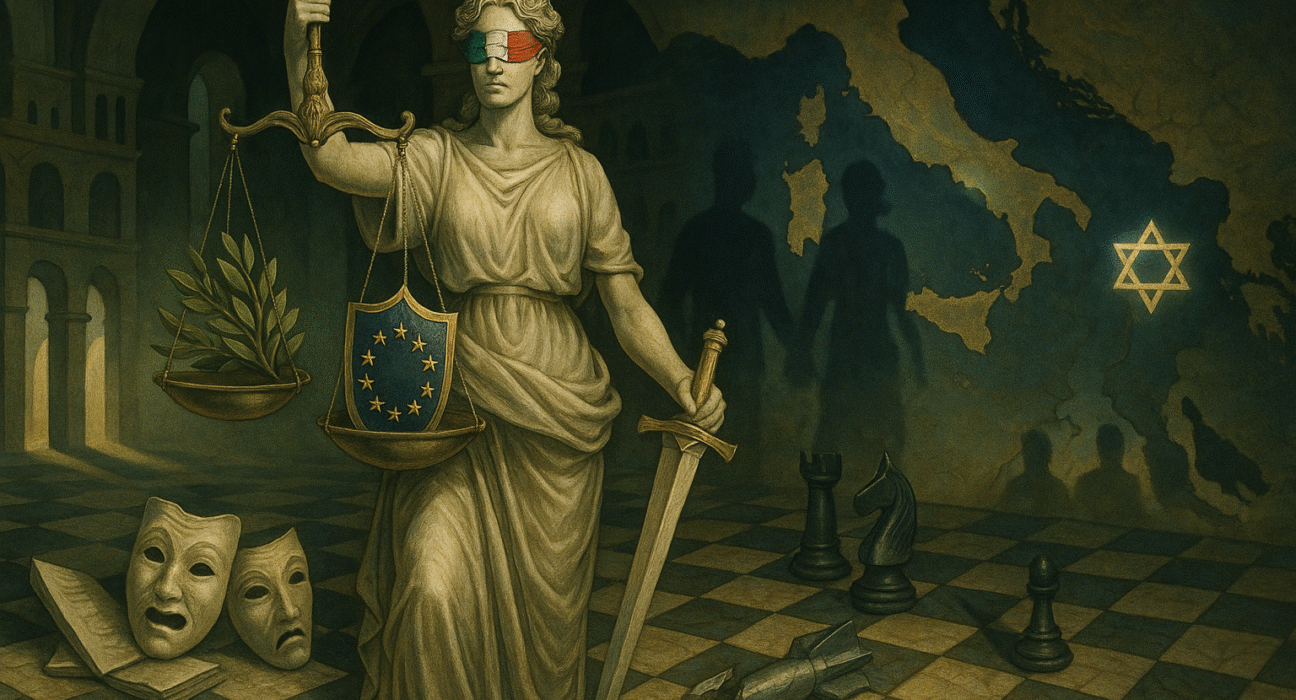by Giovanni Giacalone
As the Israeli operations against Hamas move closer to their final objectives with the beginning of the IDF operations in Gaza City, aiming to eradicate the Palestinian terrorist organization and the raids in Doha against the Hamas leadership, the masks worn by some of the European leaders begin to fall.
While the reactions coming from the French and the Spanish leaderships were largely predictable, considering their hostility towards Israel, the positions coming from the Italian government are quite puzzling but, at the same time, not surprising, as they reflect the coalition’s internal problems regarding the Israel-Hamas war.
The difficulties emerged on Thursday, September 11, when the European Parliament approved, with 305 votes in favor, 151 against, and 122 abstentions, a joint resolution presented by the Greens, Socialists, and Liberals on the humanitarian crisis in Gaza.
Italy’s three ruling parties split on the issue: Prime Minister Giorgia Meloni’s Fratelli d’Italia abstained, Foreign Minister Antonio Tajani’s Forza Italia supported the resolution, and Matteo Salvini’s Lega voted against. The divisions reflect deeper internal disagreements over Italy’s stance in the Israel-Hamas conflict, despite the government’s outward expressions of unity.
But there’s more, because the Italian votes in the European Parliament also reflect an attempt by Rome to hold a foot in both camps, perhaps with the goal of not going against Trump (who opposes the unilateral recognition of a Palestinian state), something that Meloni cannot afford, while simultaneously avoiding antagonizing Palestinian groups who have been operating undisturbed on Italian soil for decades.
It is also essential to remember how, following the Israeli raids on the Hamas leadership in Doha, Meloni immediately expressed solidarity with Qatar. An interesting position, considering that the IDF’s target was the leadership of the Palestinian terrorist organization, and not Doha (even though everyone should ponder why Qatar is hosting and supporting the leadership of a terrorist organization blacklisted by the EU, the US, the UK and Canada).
Ironically speaking, was Meloni expressing solidarity because she believes Qatar and Hamas are one and the same? And rightly so, we could add!
In the meantime, Tajani said that the Gaza City operation conducted by the IDF is “unacceptable”. However, it’s important to keep in mind that the Gaza City operation aims to put an end to Hamas’ terror rule in the strip. Does Tajani’s statement imply that Gaza should not be liberated from Hamas? If not, does the Italian government have any better options to eradicate Hamas?
As stated by Niram Ferretti, chief editor of the online publication on Israel and the Middle East, L’Informale:
“Giorgia Meloni expresses her support for Qatar after the Israeli raid on the Hamas Politburo. Years ago, she emphasized that Hezbollah wasn’t so bad because it helped the Syrian Christian minority set up nativity scenes. Months ago, she declared that Italy had suspended arms supplies to Israel immediately after October 7th. She recently called on Netanyahu to end the war in Gaza. At this point, it’s really hard to see why she doesn’t take the next step. Give her a boost and recognize the phantom Palestinian state. She could win a lot of votes.”
This is undoubtedly a further and insightful consideration worth pondering. Is it possible that the party led by Meloni is abstaining from assessing whether it is more electorally advantageous to go against Israel? Let’s recall that anti-Israel sentiment and anti-Semitism are constantly on the rise in Italy, as already illustrated by the CDEC Antisemitism Observatory, which closely monitors the phenomenon.
As if it were not enough, the Italian government has shown evident reluctance in addressing the aggressive far-left pro-Palestinian campaign which has often resulted in outright anti-Semitism. According to the government’s prevalent line of inaction so far seen, it’s better to let it out to avoid escalating social conflict. Unfortunately, the ones who pay the price are Jews, Israelis, and those who support Israel.
Publicly, Meloni has never shown particular sympathy for Israel’s war on terror against Hamas, Hezbollah, and Iran. The Italian government often talks about “avoiding escalation” but has shown no intention of clearly speaking out against Hamas, Qatar, the Houthis, Hezbollah, and Iran, the true responsible for the escalation and the destabilization of the Middle East.
It is also worth recalling that, in April 2024, during the TV show “Stasera Italia” on Rete 4 channel, following Iran’s first missile attack against Israel, the Italian Foreign Minister, Antonio Tajani, had stated:
“The Iranians have assured us that our Italian soldiers in the area will be respected…The Italian contingent in Lebanon is under the aegis of the UN, it is in a condition to be protected, I don’t think there are any dangers either for the Italian soldiers or for the Italian citizens in Israel and Iran”. As for the Houthi attacks in the Red Sea, the minister explained how he was assured that “only ships that bring weapons to Israel would be attacked”. (Agi, Apr 14,2024).
This last and unfortunate statement came at an interesting time, since the European anti-Houthi mission “Aspides” in the Red Sea was being led by Italy and Greece.
In November 2024, Italian Defense Minister Guido Crosetto hastily accused Israel of launching missiles against a UNIFIL post, only to discover shortly after that Hezbollah had launched them, with an embarrassing counter-declaration from Foreign Minister Tajani absolving Israel from any responsibility.
The Trump administration criticized the Israeli raid in Doha, while nonetheless acknowledging that the elimination of Hamas leadership represented a positive outcome. Such a nuanced position is unlikely to be echoed by Prime Minister Meloni and the current Italian government.
Naturally, if the Italian left were in power, the situation would likely be significantly worse, potentially aligning Italy more closely with the current position in Spain, if not beyond. However, this is a limited consolation. What is truly needed is a unified and strategic approach to combating Palestinian and Islamist terrorism.

